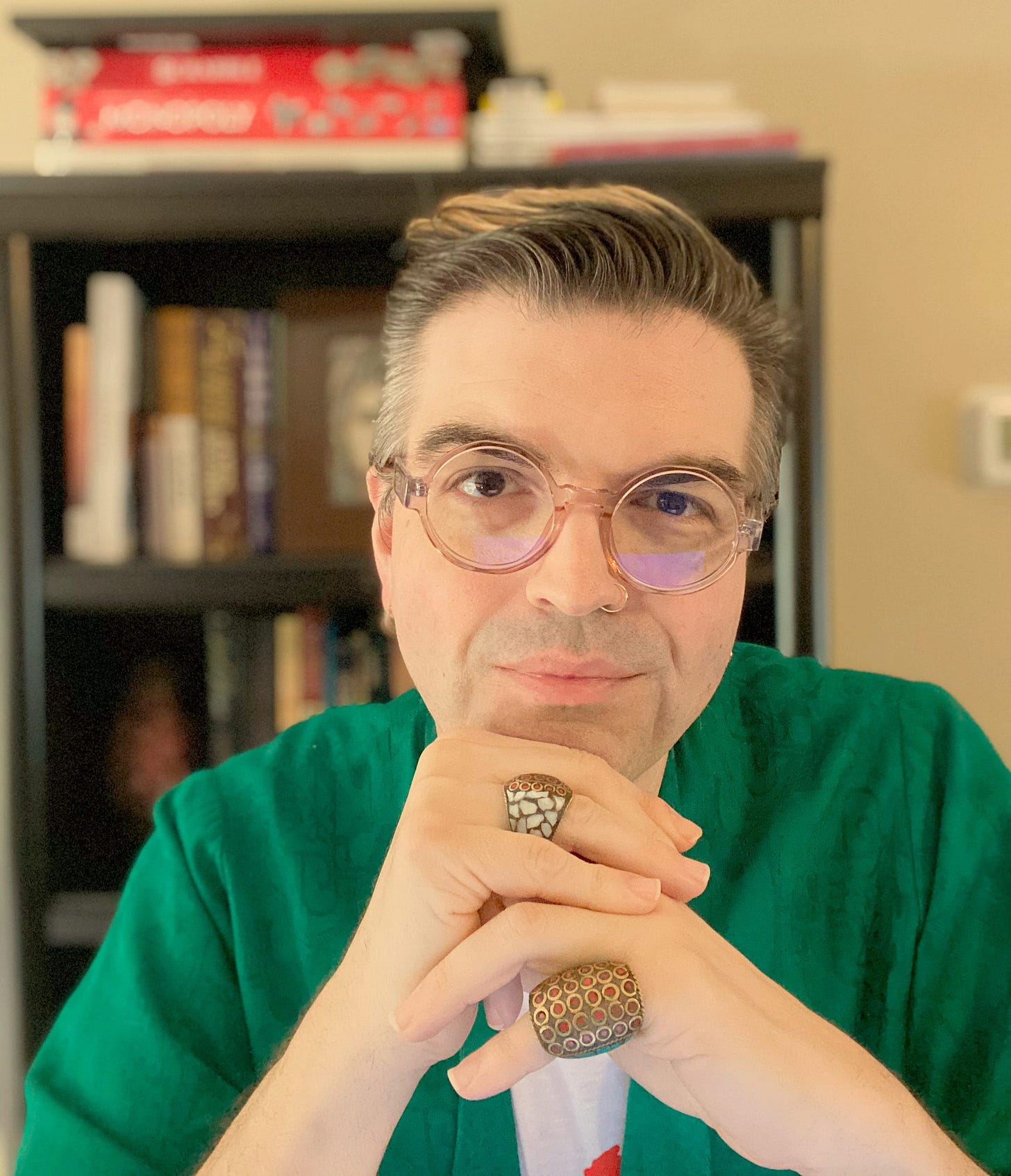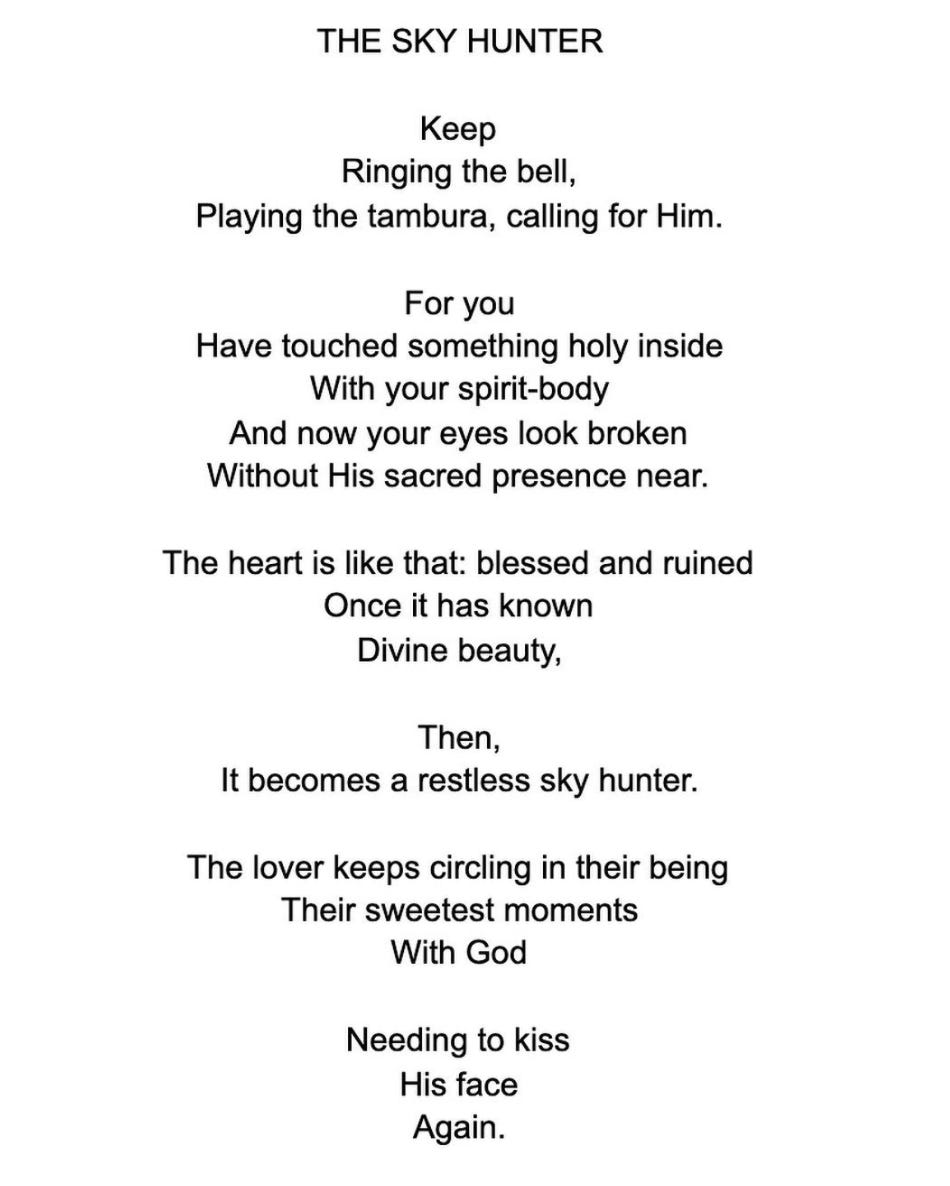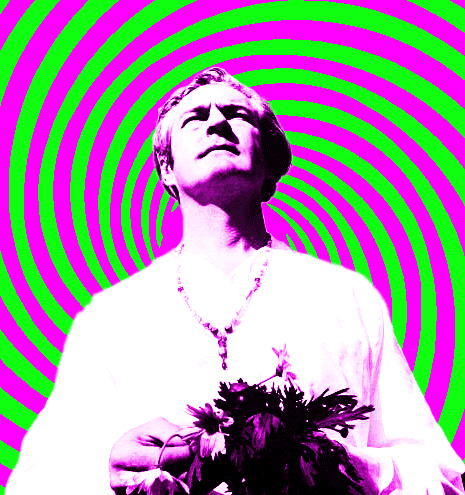Shuffle Synchronicities: Volume 1 - #241
Guest Post by Tim Dillinger (God’s Music Is My Life) + "Vapour Trail" by Ride - 09/15/21
Today we have another excellent guest post! This time from Tim Dillinger, who I connected with via Scott Frey from Sub Pub, who with a subscription, was able to research similar Substacks to mine, so that I could seek out new guest posters.
Tim’s Substack was one of the most resonant and relevant on the list, as his God's Music Is My Life also grapples with the relationship between music and spirituality, which is one of the themes of Shuffle Synchronicities as well :)
Here’s a more formal bio!
Tim Dillinger is an essayist, music historian and artist. He earned his Bachelor of Arts in Africana Studies and Women's, Gender & Sexuality Studies in 2018 from the State University of New York--University at Albany and is a proud graduate school dropout. He writes weekly features for his Substack mailing list, God's Music Is My Life and co-hosts a weekly podcast, Outlaw’s Evidence of The Unseen, with Ray Curenton.
Take it away, Tim!
“The great kick of the mystic experience is the sudden relief from emotional pressure. The only state in which we can learn, harmonize, grow, merge, join, understand, is the absence of emotion called security, attained through fine-tuning the emotions.”--Timothy Leary in Your Brain is God
I hit the shuffle button on my playlist I called Spiritual and dove back into this week’s meditation book, Timothy Leary’s Your Brain is God. The playlist contains (so far) about sixty songs that all, even in the most obscure ways, articulate a transcendent spirituality. Some of these songs only accomplish that in my mind, I’m sure.
The first song that shuffle chooses is “(I’d Know You) Anywhere” from master songwriters (Nick) Ashford and (Valerie) Simpson from their 1973 debut album, Gimme Something Real.
I’ve always thought it could be about a lover or a higher power, which is why I’ve always loved it. But this morning, I realized that it’s actually about the security, or knowing, that Leary is writing about in Your Brain is God. “A thousand hands may touch me when my eyes are closed/But I’d know you by the tenderness/the sweet, sweet tenderness/A thousand voices may call my name out loud in a crowd/but I’d know you by the melody/that flows from you.” Nick Ashford’s lyricism consistently articulates an overarching sense of the Spirit and it shows up multiple times throughout the A&S catalog in celebration of the Divine Feminine (“I’m Every Woman”)
as an expression of concern for humanity (“Send It”)
and more often than not through romantic relationships (I dare you to not find the spirituality in “Is It Still Good To Ya?”)
“Find Me” by Margaret Becker from her 1988 masterpiece, The Reckoning
follows with all of it’s 80’s big-ballad rock glory. This lyric begins with a reference to Nashville, the city I live in. “I’m gonna move on down to Elliston/let my hair grow wild & free/Rent a second story studio and find the other side of me.” It’s a bittersweet reference in 2021. Elliston used to be the more bohemian area of Nashville that drew singers and songwriters. Today it is overrun by high rise condominiums and high end restaurants. For a new Nashville generation that discovers the song today, the reference might seem strange. For any of us who remember, it is a bittersweet reminder of what was. But that’s also the point. Margaret’s lyric, “Find me/I’ll wait for you” is a beckoning for remembrance. The knowing of one’s self is not dependent on space or time, but entirely internal. We are powerful beings who can locate and actualize that place in our memory and walk, live and breathe in it, no matter what surrounds us. Margaret’s larger body of work in the early part of her career focused a lot on the concept of holiness, which in many evangelical Christian spaces is synonymous with rules and repression. But Margaret’s writing always makes me hear the word as (w)holiness which points to a very different spiritual path.
Shuffle on playlists really is a bit like drawing from a Tarot deck. There’s always a story coming together and today is no exception. “Heaven Is In Your Mind” by the all-woman avant-garde jazz ensemble Alive! (written by June Millington of the early 70’s all-woman band Fanny) begins playing next,
in a sense, finishing my sentence before I can even get it typed. “I can see it in your eyes/You really long to touch the sky/I can really see that heaven is in your mind/Holding it within your soul/You really long to let it go/I can really see that heaven is in your mind.” The notion of transcendence isn’t emotional (as Leary writes). He defines it as “conscious love”--it is “serene merging with yourself, with other people, with other forms of energy.” And this is what I sense in the thrilling vibrance of lead vocalist Rhiannon as she chants, calls to any of us listening “Love is in your heart...let it in, let it in, let it in.” Her “let it ins” are contagious--do I really find myself dancing at 6:50 in the morning? She almost makes the “thing” we are remembering touchable, just within our grasp.
The quest for this “heaven” is essential. It’s not the heaven my grandparents dreamed of in our little Pentecostal church when I was a child, but it is a space to be moved into now, in our minds and in our hearts. I’m struck daily by how much the world has changed since my entrance to this incarnation in 1975. Music has given me access to that heaven, the innate thing that has helped me remain grounded as cultural and political forces war against each other and force us to quickly navigate with every regression and progression. The songs that played themselves today, in a really sweet way, summarize the quest to transcendence and self-discovery, the heaven in my mind.
Thank you so much, Tim!
I’ve been listening to that last song, “Heaven is in Your Mind” by Alive!, and am really feeling that spiritual security that you wrote of, and how music can help give us access to the ‘Heaven is on Earth/in your Mind” absence of emotional pressure that Leary and Ram Dass and many others before and since have taught.
It was also fascinating, as it usually is, to have a completely different spectrum of music taste/aesthetics added to the Shuffle Synchronicities playlist.
Somehow I had never heard of Ashford & Simpson, and yet they were a husband & wife writing team that wrote some of the best Motown songs ever:
“Ain’t No Mountain High Enough” by Marvin Gaye, Tammi Terrell
“Ain’t Nothing Like The Real Thing” by Marvin Gaye, Tammi Terrell
“You’re All I Need To Get By” by Marvin Gaye, Tammi Terrell
And now we have a number of their songs to dance along to :)
I also love when people point out how shuffling is another form of divination like Tar I Ching.
And I think that my shuffled to song today really synchronizes with your post.
While it’s from a completely different musical palette, its lyrics seem to similarly as you said, ‘be about a lover or a higher power,’ to me at least.
“Vapour Trail” by Ride
"Vapour Trail" is the closing track of the British shoegaze band's debut album, Nowhere (1990). Written by lead guitarist, Andy Bell, the song features a distinctive swirling guitar riff and a coda that includes a string quartet. The song is the band's most well-known and would later be voted number 145 on Pitchfork’s Top 200 Tracks of the 90s.
First you look so strong, then you fade away
The sun will blind my eyes, I love you anyway
Thirsty for your smile, I watch you for a while
You are a vapour trail in a deep blue sky
From a memoiristic POV, the spiritual world had been so ‘strong’ at Esalen and for the two weeks in my hometown and for some time after.
But recently I have been feeling like it’s ‘fading’.
I’ve been ‘thirsty’ for its ‘smile’.
Particularly, I’ve been feeling sort of an emptiness in my life.
When I feel full of spirit, I feel less like I need romantic love: the intimacy and companionship.
But sometimes solitude does indeed turn into loneliness.
And all I feel left with is a ‘vapour trail in a deep blue sky.’
Somehow last night, I went from listening to my Enneagram class’ lectures for three hours to then spend an hour and a half falling down a rabbit hole of #kinkytiktok
I fear that my algorithm is forever marred LOL.
And I feel again like the Sufi poet Hafiz:
The ‘you have touched something holy inside with your spirit-body and now your eyes look broken without His sacred presence near’ aspect of the spiritual journey has happened a few times since the first awakening 2019.
Periods of time where I feel disconnected.
And it seems to fit with the second chorus of the song:
Tremble with a sigh, glitter in your eye
You seem to come and go, I never seem to know
And all my time is yours as much as mine
We never have enough time to show our love
‘You seem to come and go, I never seem to know’ Ride sings, which as Tim described, could apply to the higher power or a lover.
It’s the final two lines that suggest that living as if ‘Heaven is on Earth/in your Mind’ isn’t as constantly attainable as it feels when you do indeed feel it at times.
‘And all my time is yours as much as mine/We never have enough time to show our love.’
Our time is both the spirit’s and our ego’s. Hopefully, the latter uses it to do the former’s will. But we often never always do that.
Because, you know, we’re human ;)
But to quote another passage from Tim’s meditation for the week, it’s great to find another kindred spirit on Substack, practicing what the other Tim preaches:
“The…processes…that every spiritual teacher has passed on to humanity for the past thousand years. First, look within, glory in the revelation. Second, then express it in acts of glorification on the outside…after you turn on, don’t spend the rest of your life contemplating the inner wonders. Begin immediately expressing your revelation in acts of beauty. That’s very much a part of our religion—the glorification, the acting out, the expression of what you have learned.” -Timothy Leary
Okay, that’s the two hundred and forty-first Shuffle Synchronicities.
Today in Other! Substacks, check out our guest Tim Dillinger’s Substack’s God’s Music Is My Life’s very well-researched piece on Amy Grant, where he reexamines the unprecedented album that put the Christian pop artist alongside Madonna, Huey Lewis, and Duran Duran in the zeitgeist.






